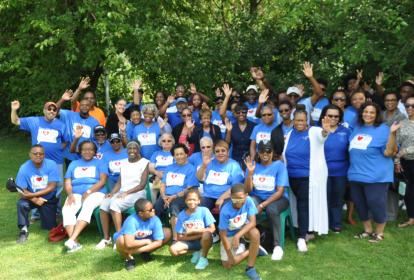 St James AME Church, Elgin, Illinois
St James AME Church, Elgin, Illinois
 HEALTH & WHOLENESS NEWSLETTER: June 2005
HEALTH & WHOLENESS NEWSLETTER: June 2005





Posted on Wed, Jul 27, 2005
June is Men�s Health Month
June is Men�s Health Month
Prostate Cancer:
Did you know that men die of cancer at almost twice the rate as women with a one in two chance of developing cancer in their lifetime? The leading cancer sites for men are prostate, lung, and colorectal cancer, however men receive little education and training for self-detection or prevention. An estimated one in five men will develop prostate cancer in their lifetime. Men should know that there are several options for treating prostate cancer and early diagnosis and treatment is key to survival and treatment success. Every man over forty should have a digital prostate examination. Early warning signs of prostate cancer include restricted flow of urine, pain in the prostate region or perineum and sexual dysfunction.
Men and Heart Disease:
Heart disease is the leading cause of death for American men? One in three men will develop some form of cardiovascular disease before 60 years of age. The National Institutes of Health and others have found that over three-quarters of all heart disease is related to diet and stress. Yet, studies have shown men are not as concerned about diet and stress levels as women. Stress contributes, not only, to heart disease, but also to other disorders.
Why Men Don�t Go to the Doctor:
According to a recent survey by Men's Health magazine and CNN, one-third of American men have not had a checkup in the past year. Nine million men haven't seen a doctor in five years. Every year, men make 150 million fewer trips to doctors than women. An American Medical Association study found that men don't go to the doctor because of fear, denial, embarrassment, and threatened masculinity. To admit to having pain or some other problem is seen as a confession of weakness. It threatens our male pride and our provider roles, the things we've grown up with and that we've been taught. The male denial factor is unrelated to occupation, age level, race or socioeconomic status. No matter how smart a man is, no matter what kind of professional status he's achieved, he can still ignore things he shouldn't ignore and pay the unnecessary consequences. Those consequences can be serious. By age 65, one in three men suffers from high blood pressure, a primary risk for heart attacks. Yet men are less likely than women to have their blood pressure checked. Men are 30 percent more likely than women to have a stroke. Clearly, the price of denial is high. See your Doctor�and make it soon.
Discussion:
HEALTH & WHOLENESS NEWSLETTER: June 2005
No messages have been posted.
You must first create an account to post.